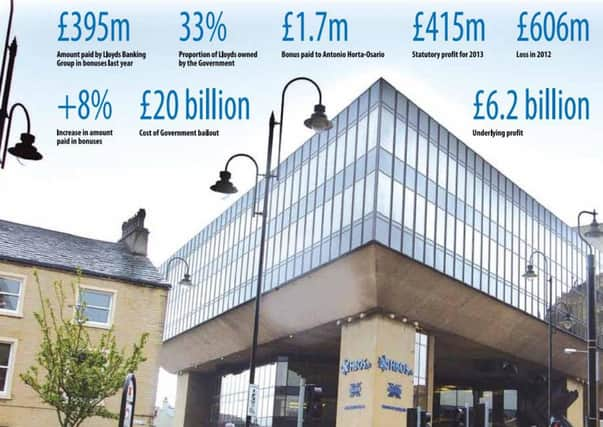Rejuvenated Halifax welcomes more customers, cuts complaints


The bank’s director David Nicholson said the group has seen a massive improvement from three years ago when the bank was suffering in the aftermath of the takeover by Lloyds at the height of the banking crisis.
“Three years ago the complaint level was 2.5 per 1,000 customers so we’ve seen real progress,” he said.
Advertisement
Hide AdAdvertisement
Hide Ad“We looked at what was going wrong and we made life much easier for customers.
“We’re also the most switched to bank. Last year 238,000 people switched to Halifax, putting us in the number one position.”
The bank introduced a seven-day switch in the second half of last year, which boosted switch-overs from 100,000 in the first half to 138,000 in the second half.
Halifax’s parent company, Lloyds Banking Group, said yesterday that it was ready to return to private ownership after reporting a pre-tax profit for the first time in three years.
Advertisement
Hide AdAdvertisement
Hide AdLloyds’ chief executive Antonio Horta-Osorio has turned around the bank’s fortunes since taking the helm in March 2011, slimming it down to focus on lending to UK households and businesses and meet tougher regulatory requirements on capital.
But the bank risked a political backlash by paying out £395m in bonuses last year, up eight per cent on the previous year, including a £1.7m award to Mr Horta-Osorio. His bonus will be paid in shares and is deferred for five years.
The bosses of Barclays and state-backed Royal Bank of Scotland have both waived their 2013 bonuses.
Barclays angered politicians and unions this week by increasing bonuses for its investment bankers by 13 per cent.
Advertisement
Hide AdAdvertisement
Hide AdLloyds, 33 per cent owned by the Government, made a statutory pre-tax profit of £415m for 2013, up from a loss of £606m in 2012, and increased lending in Britain by three per cent.
Mr Horta-Osorio said that the bank is now ready to return to full private ownership whenever the finance ministry and UK Financial Investments, which manages the Government’s shares, decide it is right to do so.
“We absolutely consider ourselves back to normal. It’s absolutely up to UKFI and the Treasury to decide how and when to dispose of those shares,” he said.
Lloyds needed a £20bn bailout in the financial crisis which left taxpayers with a 39 per cent stake.
Advertisement
Hide AdAdvertisement
Hide AdChancellor George Osborne wants to sell the shares before the next election in 2015 and UKFI and the Treasury are assessing options for future sales.
The Government kicked off the process with the sale of a six per cent stake last September.
Banking and political sources expect a second sale of Lloyds’ shares to institutions such as pension funds and insurers in March or April followed by a larger offer including retail investors later in the year.
Shares in Lloyds have more than doubled over the past two years.
Advertisement
Hide AdAdvertisement
Hide Ad“The investment case is unaltered. However, Lloyds shares may flat-line ahead of any government placing,” Numis analyst Mike Trippitt said.
The Unite union criticised a two per cent pay rise for staff at branches and call centres this year at Lloyds, which has cut more than 35,000 jobs since its bail- out.
“The CEO’s £1.7m bonus, on top of shares worth millions awarded at the end of October are a kick in the teeth to the taxpayer, and to hard-working staff who don’t know if they will be next in line for the chop from one day to the next,” Unite national officer Rob Macgregor said.
Lloyds, which owns Bank of Scotland and is registered in Edinburgh, would be affected if Scotland voted for independence in September. Mr Horta-Osorio said the bank would have time to assess its options.
Advertisement
Hide AdAdvertisement
Hide Ad“If the vote is a ‘yes’, there will be 18 months until separation is implemented so therefore we believe we have more than enough time to assess the consequences or actions we would need to take.”
Lloyds and part-nationalised rival Royal Bank of Scotland are drawing up contingency plans in the event of a ‘yes’ vote.
Lloyds said it expected to apply to the regulator in the second half of this year to restart dividends, which would boost the prospect of further stake sales. It last paid a dividend in 2008.
Mr Horta-Osorio said he expects to pay out at least half of Lloyds’ earnings in dividends over the medium term.
The bank took £3.5bn more in provisions last year.